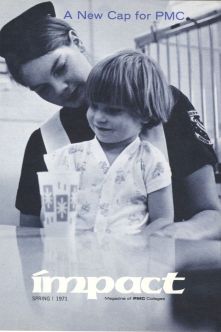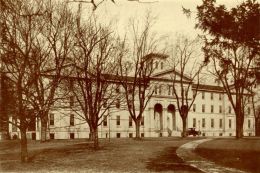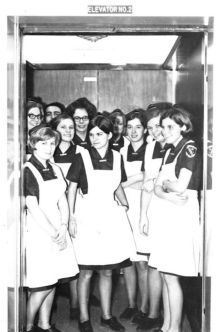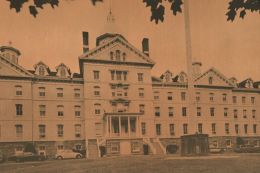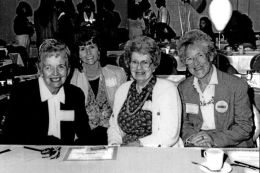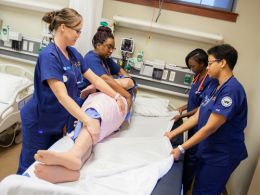School of Nursing Celebrates 50 Years
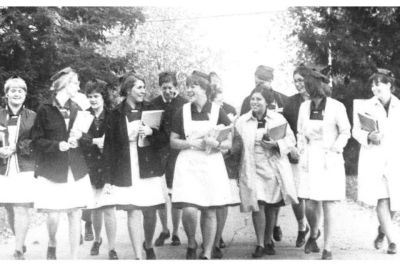
For 50 years, Widener’s School of Nursing has shaped a tradition of excellence. Since it was acquired by the university in 1970, this nationally recognized program has prepared generations of nursing students with the knowledge, curiosity, and compassion to not only provide care, but to advance the science of nursing. The School of Nursing has been a consistent leader, through its commitment to educate students, serve the community and contribute to the evolving health care landscape.
“The School of Nursing has grown from its roots as a regional baccalaureate program meeting healthcare workforce needs locally, to a nationally recognized school that offers dynamic undergraduate and graduate programs for students who go on to be leaders in practice and education across the globe,” said School of Nursing Dean Anne Krouse.
Today, the School of Nursing is comprised of nearly 40 dedicated faculty members who lead more than 1,000 local and international students both online and on two campus locations. Current and former faculty and staff along with students and alumni will mark the anniversary with a celebration on Saturday, September 21 to honor the school’s impact and those who contributed to its legacy.
“From the first class to our newest alumni, our students impact the lives of patients and the wellness of communities through
evidence-based and compassionate care, excellence in education, and meaningful research,” Dean Krouse said. “Their successes are possible because of dedicated faculty and staff, both past and present, who continue to deliver on the school’s commitment to high-quality learning experiences and personalized education.”
The School of Nursing’s origins trace to 1966 at the Chester Crozer Foundation, a degree-granting institution founded in partnership between the Crozer Theological Seminary and the Crozer-Chester Medical Center in Upland, Pennsylvania. First known as the Crozer Foundation College of Nursing, the program was spearheaded by Dr. Ronald V. Wells, president of the Crozer Theological Seminary, and founding Dean Dr. Theresa Lynch. While unusual for a theological seminary to oversee a nursing program, the School of Nursing’s unorthodox beginning was the first of many innovations that set the program apart.
Nursing arrived at Widener in 1970 after the Crozer Foundation dissolved, but the clinical affiliation with Crozer-Chester Medical Center remained intact. The nursing program needed an academic institution interested in acquiring an accredited and growing baccalaureate nursing program with eight full- and part-time faculty, 30 students and a nursing education library.
Widener had been in the midst of its own transition. Then known as Pennsylvania Military College, it was eager to expand enrollment to civilian daytime students. The changing landscape created a unique and timely opportunity.
The program’s first decade at Widener saw a period of significant growth with enrollment increasing from fewer than 40 to more than 450 nursing students. It quickly outgrew its original lab and classroom space in Kirkbride Hall, necessitating a campaign to create larger, better-equipped facilities. In 1981 the program relocated to Old Main after a $1.5 million renovation project transformed the university’s landmark structure into an innovative Center of Nursing that featured audio-visual units, medical libraries, and patient-care labs.
During the 1980s the Center for Nursing, whose name changed to the School of Nursing in 1982, began to diversify its course offerings in response to changing needs in the community and in nursing education. With $250,000 secured in federal funding for graduate programs, the school garnered national attention with the creation of the Burn, Emergency and Trauma graduate program -- one of only three in the nation and the first comprehensive program in the northeast. By 1983, the master of nursing, doctorate, and RN-to-BSN programs were added, each addressing the need for advanced and accelerated nursing education in the region. The school created two post-doctoral certificates in nursing research and nursing education this year. They are the first of their kind in the nation.
The program expanded geographically in 1994 with a second location based out of Widener’s campus in Harrisburg. More than 25 years after opening, that location now offers 14 pathway programs at the certificate, accelerated, undergraduate, graduate and doctoral level.
The School of Nursing moved to its current home on the main campus, in Founders Hall, in
2011. The space, equipped with a state-of-the-art Center for Simulation and Computerized Testing, ushered the program into the future of nursing education. Its proven success, guided by expert faculty and high-caliber community and hospital affiliations, earned the school a Center of Excellence for Advancing the Science of Nursing Education designation, awarded to only six schools nationwide, by the National League of Nursing in 2013. A few years later, the Leadership Center for Nursing Education Research was established, underscoring the program’s commitment to evidence-based research and scholarship.
Over the last half century, the School of Nursing has grown into a powerhouse program that is influencing the future of nursing and health care. Anchored by an expert and dedicated faculty, the program’s mission has remained rooted in rigorous academics, evidence-based research, student-faculty mentorship, and service learning. Its intricate history laid a foundation that will continue to support future generations of nursing excellence.

